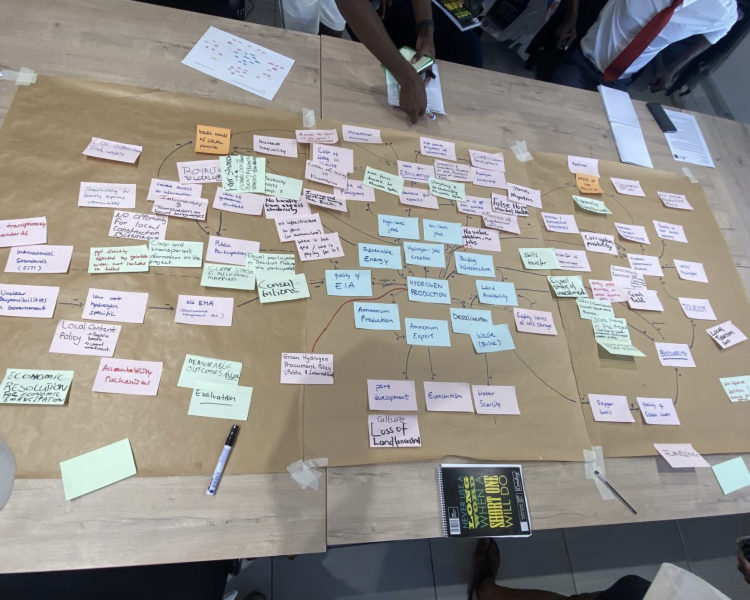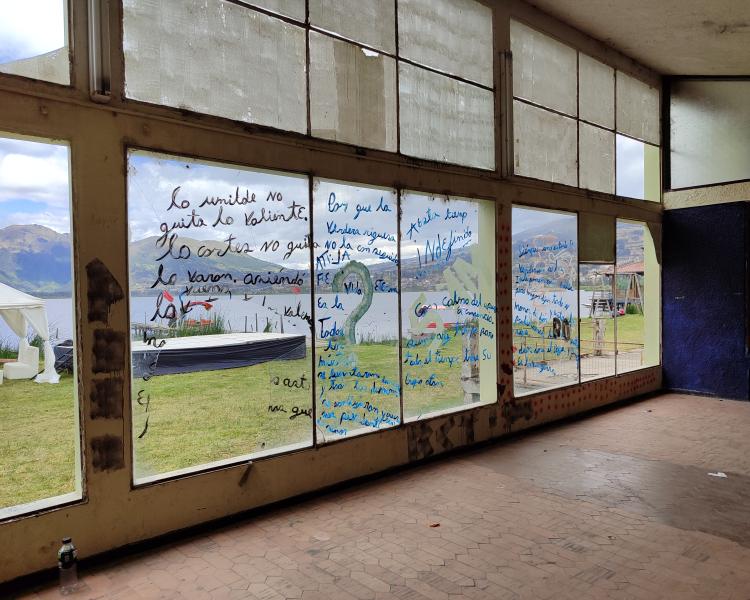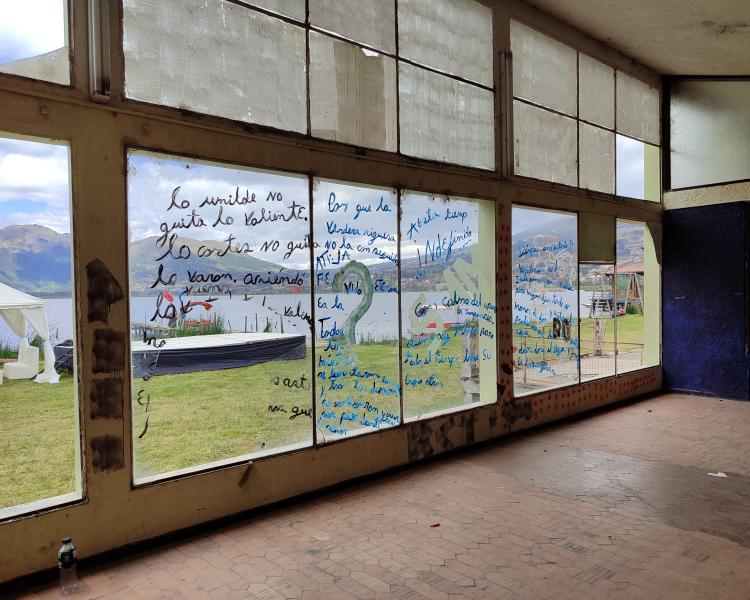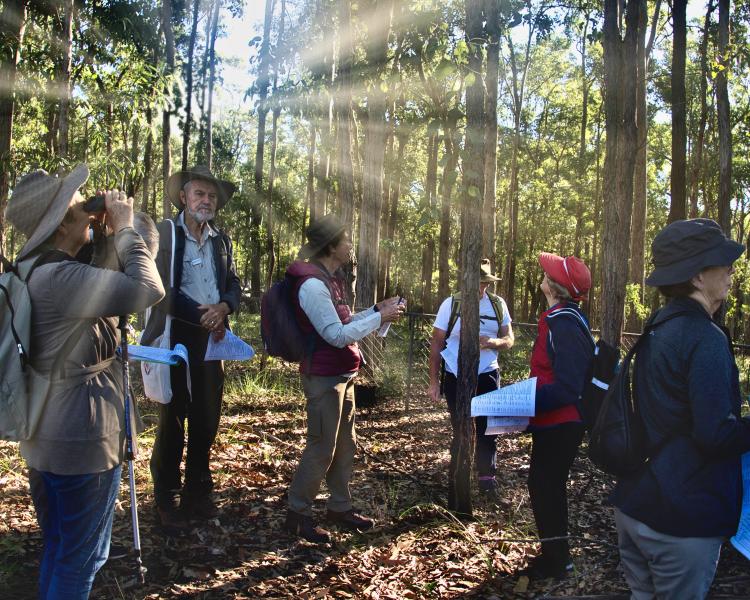The world’s problems are interconnected. They demand an integrated response.
The Ignacio Ellacuría Thesis Grant supports the fieldwork of two research students at the University of Oxford. From 2025, both MPhil and DPhil students are eligible. The grant aims to encourage students to design their projects using an integral ecology approach that is:
- Transdisciplinary in its research design
- Sensitive to locality and participant perspectives
- Connects ecological, political, scientific, economic, and religious issues.
Applications are now closed
Congratulations to the 2025 Ignacio Ellacuría Scholars! Read their profiles here:
Stories from the field: conversations with Ignacio Ellacuría scholars

"People change the way you see things": a just green hydrogen transition in Namibia
2024 scholar Marlene Merchert shares her advice on research design, and the importance of asking the right questions.

Care at the core of research: visual narratives in Imbakucha
2024 scholar Marc Mariner-Cortés shares his reflections on care, his experience in Ecuador, and how to choose sources intentionally.
This grant exists to encourage DPhil and MPhil students to deploy an integral ecology approach to their fieldwork. This will entail responding to the specific needs of a local community or group that has been experiencing a socio-environmental harm, by means of transdisciplinary methodology that is sensitive to different epistemologies, especially those not usually incorporated into academic research. Here at the LSRI, that’s how we believe our complex global situation must be addressed.
Via a competitive application process, we can award two grants of £1,600 every year towards fieldwork costs (including travel, accommodation, primary data collection) or original archival work. But perhaps more importantly, you will be connected to a growing cohort of Ignacio Ellacuría scholars based at the LSRI. This gives you the opportunity to consult with our research staff as you plan your fieldwork, to present your findings at a specially arranged seminar at Campion Hall, and even to publish your work as one of our Research Papers (subject to review).
I am grateful to the LSRI grant for providing me with the resources necessary to undertake a novel and unique approach to unravelling the complexities of massive renewable energy installations. As part of this experience, I lived near and explored the world's third largest solar park and conducted focus groups and interviews to learn about how these pieces of infrastructure are reshaping political, social, economic, and policy realities. The LSRI grant, through its focus on socio-environmental issues, allowed me to highlight the voices of marginalised communities whose stories are being obscured in modern-day climate discourse.
-
About the Grant
In November 1989, amidst El Salvador's civil war, Ignacio Ellacuría, a philosopher and university president, was murdered alongside his fellow Jesuits for daring to imagine a different kind of scholarship – one that placed academic excellence in direct service of social transformation and a preferential option for the poor.
Today, at the LSRI, his vision lives on through an innovative grant scheme that carries his name and embodies his core belief: universities as transformative institutions, where rigorous academic inquiry must respond to the cry of both the earth and its most vulnerable peoples.
Each year, this competitive grant enables two students to conduct research that transcends conventional disciplinary silos and serves communities. Whether through anthropological photography, the mapping of energy justice frameworks through psychology, transformation and community development for marginalised populations, analyses on colonial violence, or First Nations projects of nation-building and sovereignty, we are building a community of scholars who are changing the way research is done.
Launched in 2022 as an MPhil grant under the name of Ignacio Ellacuría MPhil Thesis Grant, the scholarship now supports both DPhil and MPhil students. -
Eligibility and requirements
The grant is open to DPhil and MPhil students across all departments and faculties at the University of Oxford, in any division or department (social sciences, humanities, physical and life sciences, continuing education).
The grant must be used for the costs of empirical research (including travel, data collection and other fieldwork-related expenses) and not to cover tuition fees or living expenses in Oxford. For students in the Humanities, the grant can also be used for original archival research or for a trip that is necessary to allow this to take place. Funding must be spent between June-September 2025, and used to support original research that will be incorporated into the student’s final submitted thesis. In order to be eligible for funding, research must address a contemporary socio-ecological problem in an integrated way, including:
- Research must be transdisciplinary in its methodology (that is, it must bridge at least two disciplines across the Natural Sciences, the Social Sciences or the Humanities, facilitating a systemic way of addressing the problem identified)
- Research must respond to the specific needs of a local community that has been experiencing social and environmental harm
Following their fieldwork, successful candidates will be required to provide:
- An update on their research at a seminar to be arranged by the LSRI to take place in Trinity Term 2026.
- One piece of writing for the LSRI website based on their research experience (the format of this will be agreed in due course).
- A profile and other relevant material for LSRI website.
-
How to apply
To apply, you will need the following documents:
- A 1,000 word research proposal that indicates clearly how your thesis research fulfils the above criteria
- A one-page budget proposal that justifies the amount of funding requested
- A brief statement of support from your thesis supervisor (this can be an email forwarded along with the research and budget proposals)
Please send these by email to Ms Harriet David (lsri.administrator@campion.ox.ac.uk).
Deadline for applications: Tuesday 22 April at 12pm. A small panel will be convened to consider applications and a decision will be made by 5 May.





